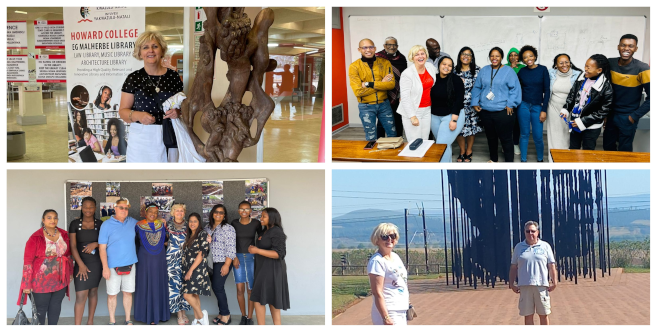 Professor Beata Pitula (top left) with participants at the seminar on: Models of Professional Development for Preservice Teachers in Poland.
Professor Beata Pitula (top left) with participants at the seminar on: Models of Professional Development for Preservice Teachers in Poland.Reflections of My Stay at UKZN
Click here for isiZulu version
- By: Professor Beata Pitula
Thanks to the invitation of Professor Angela James (School of Education), I had the opportunity and undoubted pleasure to spend almost a month at UKZN. It was a special time as Professors James and Daisy Pillay prepared an inspiring programme for my stay. I was able to meet many interesting people, academics, PhD students and also undergraduates. To see many wonderful places like the Nelson Mandela Museum, immerse myself in the life of the city of Durban, participate in many social events/celebrations, and visiting schools and kindergarten was a valuable experience. I had the opportunity to have fruitful discussions and debates on new educational strategies or pressing educational issues.
My impression is that South Africa is like an open book that invites you to participate in its history. It is hard to deny the existence of many problems that clearly leave their mark on every aspect of the lives of the people of this beautiful and troubled country, but it’s also hard not to notice the tremendous efforts to overcome difficulties, remove barriers, and deal with the legacy of the apartheid rule.
Education is where reality is reflected as in a mirror, where attention is focused on the best and on what deviates from the ideal pattern.
What, in my opinion, is unique and worthy of emphasis and preservation is the truly cordial relationship between students and teachers/academic staff; the enormous involvement of teachers in all activities aimed at providing comprehensive support to students; the continuous work of the academic community to integrate this multi-national, multi-racial society broken by years of apartheid; and the generally positive attitude of the people towards life, its unpredictability and changeability, and their openness to others.
What needs to change, in my opinion, is the improvement of working conditions for teachers, better equipment for schools, and the elimination of differences in the quality of education between private and public schools. After all, equal rights for all in education does not just mean that it should be available, it also means that members of all social groups should have equal access to education, that teachers should be highly qualified, and that there should be a wide range of educational opportunities so that everyone can choose the one that best suits their needs and aspirations.
I combine the unforgettable impressions of my stay with the hope that the necessary changes in the education system will be implemented quickly and with excellent results. I wish and believe that this will happen because after all, South Africa is a country of unlimited opportunities and its citizens deserve to fully enjoy them.
Professor Beata Pitula is a graduate of the Faculty of Pedagogy and Psychology at the University of Silesia. She holds a PhD in Humanities in the field of Pedagogy and Pedeutology, and a Habilitation in Social Sciences in the field of Pedagogy and Pedeutology. She is the author of 18 scientific monographs (including four co-authors and nine scientific editors) and more than a hundred articles in the field of pedagogy, especially on the issues of teacher training and professional functioning of teachers, as well as on the problems of pedagogical counselling in the broad sense. She is a member of many scientific boards of Polish and foreign scientific journals, and cooperates with universities in Poland and abroad.
Opinion piece: Beata Pitula
Photographs: Supplied
*The views and opinions expressed in this article are those of the author and do not necessarily reflect the official policy or position of the University of KwaZulu-Natal.



